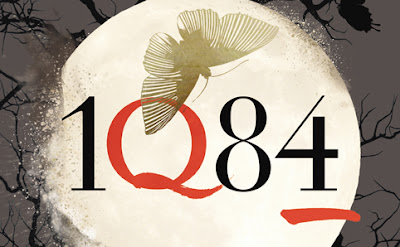I finally finished it; Haruki Murakmi's whopper of a 900 page 3-part novel, IQ84. Critics are calling it his magnum opus. I hope not.
To finish a Murakami novel is to be puzzled, irritated, yet strangely satisfied and wanting more. Even with author's gorgeous final scene I was more than happy to leave this. The only reason I’d read more is in the hope of tying up the books plethora of a loose ends and nebulous sub-stories
There's always a whimsical logic to the Murakami novels, and 1Q84 is no exception. In an electrifying opening passage, thirty-something Aomame, in heels and suit climbs down the escape passage of a gridlocked Tokyo highway. This action leads her to a parallel universe which she comes to call “IQ84” , a place where two moons fill the night sky and “ logic holds no meaning". From there her story becomes one of many. Sub-story piles upon sub-story, all of them with their own particular strain of Murakami style weirdness. Interesting, yes, but to have a reader follow abstractions for 900-pages is a big ask. Especially when it is over-counter balanced with the banal.
Murakami is lauded and loved for describing the everyday with a magical touch. Perhaps in order to showcase these skills, many of his novels feature long periods where essentially nothing happens, which is to say everyday life happens. For example, "The Wind up Bird Chronicle" had its lead cooking endless amounts of pasta. There it worked, but in 1Q84 it simply occurs too often. There is no period in the novel when one character isn't sitting in an apartment, listening to classical music and reading or similar. And that's another thing about Murakami novels; everyone seems to have an encyclopedic knowledge of both. IQ84 seems almost crotchety in its tastes; gone are the freewheeling pop samplings of Norwegian Wood or Dance, Dance, Dance.
Then there’s the characters themselves. Tengo is the archetypal Murakami lead male; a pacifist writer, part-time math teacher. You'll notice that he never really does anything at all; nor does anything really happen to him. In this way he's less satisfying than previous Murakami protagonists. Those guys didn't do much either, but a lot was done to them. One of the most satisfying parts of reading Murakami is when these underdogs finally bite back. There's no such thing here. Instead Tengo spends much of the novel whining about his father and pining for his primary-school sweetheart.
If that sounds fairly adolescent, it is. Tengo and Aomame spend the novel trying to locate one another, twenty years after holding hands. Once. When they were ten. It's a romantic notion that can't hold over so many pages and so much boredom between. It’s nine hundred pages of a literary Edward and Bella sans payoff. Despite the endless descriptions of their minutia, we never get much closer to the two of them; in part because their central motivation is so implausible. Not to mention infuriating. Perhaps purely for the sake of prolonging their agony, neither seem to translate their longing into action. Both come into contact with private detectives yet they never ask for a phone number or addresses. Even when offered they refuse. It’s a relief when a third narrator finally arrives in the third part. I won't mention who, but they're a welcome relief from the endless teenage longing of those moon-crossed lovers.
As for story, 1Q84 has too much to cover here, or even in itself for that matter. There's an acupuncture assassin, cult religions, pointless ongoing references to Orwell's 1984, riffs on story telling, Chekhov's time in Sakhalin, almost flippant rape and molestation, butterflies, two moons.. it goes on. And on. Likewise I could go on and on. Should you read it? If you like Murakami, yes. If you haven't read him don't make this your first. IQ84 has a lot of fantastic moments and lovely writing, but very little of it holds together, and for once it doesn't look like it's on purpose.

No comments:
Post a Comment